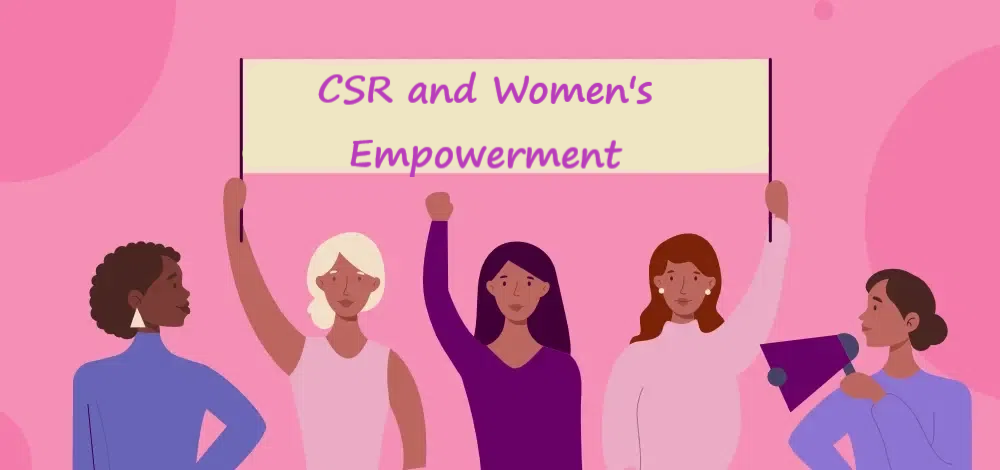

Today, women’s empowerment is an imperative need in our society to foster equality, inclusivity, and progress. According to McKinsey, India can add nearly USD 770 billion to its GDP by 2025 just by offering equal opportunities to women. However, women from marginalised and underprivileged communities continue to face systemic barriers and discrimination. It is essential to address these challenges and create a more equitable world.
CSR as a Catalyst
CSR mandate has allowed us to work with the less privileged and uplift societies to create an impact. Most corporates have an inbuilt system and capacity to deliver efficiently, ethically, and quickly any project they undertake.
Thus, Corporate Social Responsibility (CSR) has become a fundamental and impactful part of the corporate landscape that goes beyond profit-making and involves contributing positively to society, including empowering women. Through CSR activities, companies can create a more equitable and inclusive society where women have equal opportunities and access to resources, promote gender equality and women’s rights, and support their social and economic advancement.
CSR activities enable companies to address health and sanitation challenges faced by women. Initiatives such as providing access to clean drinking water, sanitation facilities, adequate nutrition, and healthcare services benefit women, particularly in rural areas. Companies can empower women to lead healthier lives by improving health and hygiene conditions.
Here are some areas where CSR contributes to women’s empowerment:
Education and Literacy
CSR initiatives support education and literacy programmes targeting underprivileged girls and women. This involves setting up schools, scholarships, vocational training centres, and initiatives to promote girl child education. In underprivileged communities, access to quality education can break the cycle of poverty, with educated women often investing more in their children’s education and health. This will also help them make informed choices and 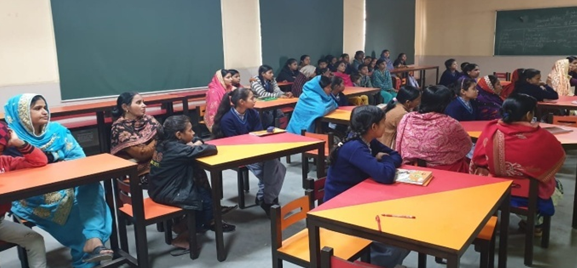 acquire skills for better employment opportunities, fostering their empowerment.
acquire skills for better employment opportunities, fostering their empowerment.
As part of our Newgen Digital Discovery Pathshaala (NDDP) initiative, we have initiated a digital literacy programme for the mothers of our 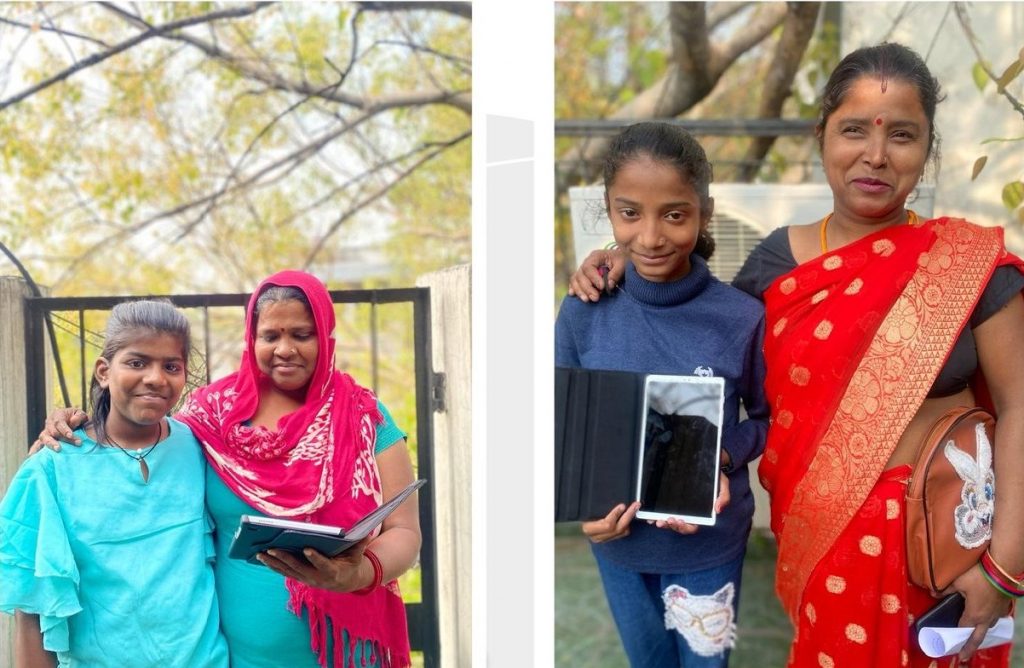 NDDP students. The aim is to provide access to technology and create awareness about various aspects like women’s rights, mental and physical health, hygiene, etc. Needless to say, NDDP has catalysed a remarkable transformation. Our programme has drawn these mothers out of the shallows of the lives they were navigating, and together with their daughters, they have started a new journey of awareness and self-worth.
NDDP students. The aim is to provide access to technology and create awareness about various aspects like women’s rights, mental and physical health, hygiene, etc. Needless to say, NDDP has catalysed a remarkable transformation. Our programme has drawn these mothers out of the shallows of the lives they were navigating, and together with their daughters, they have started a new journey of awareness and self-worth.
Health and Sanitation
 Many girls in India from marginalised societies have little or no access to basic health services. A study revealed that a quarter of the girls do not attend school during menstruation due to a lack of access to adequate sanitation facilities. Women in rural areas struggle to meet their sanitary requirements. Poor sanitation can only lead to numerous health issues, including intestinal worm infections, polio, and typhoid.
Many girls in India from marginalised societies have little or no access to basic health services. A study revealed that a quarter of the girls do not attend school during menstruation due to a lack of access to adequate sanitation facilities. Women in rural areas struggle to meet their sanitary requirements. Poor sanitation can only lead to numerous health issues, including intestinal worm infections, polio, and typhoid.
Another hidden crisis is the malnourishment of women and girl child in India. According to the National Family Health Survey (NFHS), over 55 per cent of women in India are anaemic. Early marriage, multiple pregnancies, and poverty are just a few factors contributing to high malnourishment rates in women and the girl child.
CSR initiatives can promote financial inclusion for women and facilitate access to financial services, including microfinance and financial literacy programmes. Apart from encouraging women to seek opportunities, it will also reduce their problems stemming from financial dependency on male relatives and contribute to household and community development.
CSR activities enable companies to address health and sanitation challenges faced by women. Initiatives such as providing access to clean drinking water, sanitation facilities, adequate nutrition, and healthcare services benefit women, particularly in rural areas. Companies can empower women to lead healthier lives by improving health and hygiene conditions.
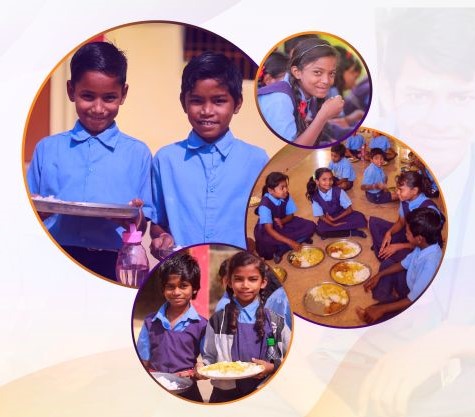 We also partnered with The Akshaya Patra Foundation to administer a mid-day meal programme, providing nutritious meals to students attending government schools. Presently, we provide over 10 lakh midday meals, reaching out to disadvantaged communities in remote locations and ensuring every student gets a chance at healthy living and a conducive environment to pursue education. This impactful initiative resulted in reduced dropout rates from educational institutions, enhanced focus on academics, and better nutritional status of the students.
We also partnered with The Akshaya Patra Foundation to administer a mid-day meal programme, providing nutritious meals to students attending government schools. Presently, we provide over 10 lakh midday meals, reaching out to disadvantaged communities in remote locations and ensuring every student gets a chance at healthy living and a conducive environment to pursue education. This impactful initiative resulted in reduced dropout rates from educational institutions, enhanced focus on academics, and better nutritional status of the students.
Advocacy and Awareness
The well-being of women has mainly focused on educational and economic empowerment. Empowering women as individuals who understand and claim the same opportunities, rights, outcomes, and obligations as men is necessary. Companies can leverage their CSR platforms to raise awareness about women’s rights, gender equality, and social issues. This can involve public campaigns, NGO partnerships, and employee volunteering programmes. CSR initiatives by companies to promote advocacy and create awareness will help change societal mindsets and challenge gender stereotypes. It will boost their self-esteem and encourage them to assert their societal rights.
Financial Inclusion
Most women living in rural areas are seldom financially independent, making it impossible for them to pursue suitable livelihood opportunities. In 2023, the majority of women continue to struggle with financial accessibility.
CSR initiatives can promote financial inclusion for women and facilitate access to financial services, including microfinance and financial literacy programmes. Apart from encouraging women to seek opportunities, it will also reduce their problems stemming from financial dependency on male relatives and contribute to household and community development.
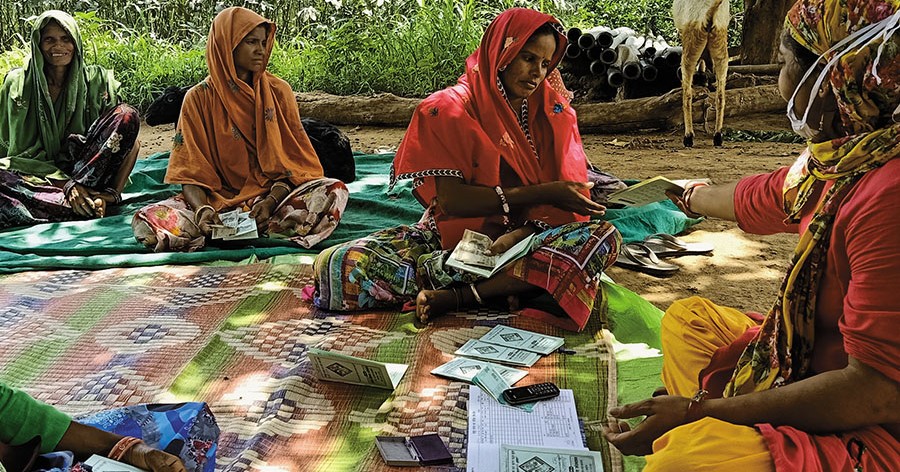
A unique, tried and tested way to help women advance in financial inclusion is by creating Self Help Groups (SHGs), where a group of women borrow money from a bank and select a leader who ensures the loan is repaid. Studies have shown that 98 per cent of loans are repaid on time by SHGs. Financial literacy workshops, livelihood enhancement programmes, and adopting digital financial tools can also create financial awareness among women.
A holistic approach to social, political, economic, and health is required to empower women and create an equitable and prejudice-free society. Inclusive participation of women in the workplace, access to equal opportunities and resources, digital and financial education, placing them in positions of power, and encouraging gender parity are some ways CSR could contribute to women’s empowerment.
Community Engagement
“When women gain new skills, they become role models and mentors in their communities, inspiring others to pursue their aspirations.”
Engaging with local communities is crucial from the CSR perspective. Collaborating with community-based organisations allows organisations to identify women’s challenges in different regions and tailor their initiatives accordingly. This ensures that CSR efforts are contextually relevant and have a more significant impact on women’s empowerment.


Interestingly, after the success of our digital literacy workshop with mothers, we decided to move one step further and added a new leaf to the NDDP mothers’ programme called Kaushal Vikas Samuh (KVS). We kickstarted with an initial assessment of their skill sets, which led to the formation of a dedicated group of mothers passionate about crocheting and knitting.
Within a few weeks, more and more mothers eagerly joined the KVS, as they had always yearned for a space and platform to explore and celebrate their innate abilities. Thus, with every stitch they knit, mothers are weaving a brighter future for themselves, their daughters, and their entire families. This year, before Diwali, we intend to exhibit their creations across all our offices.
The Bottom Line
A holistic approach to social, political, economic, and health is required to empower women and create an equitable and prejudice-free society. Inclusive participation of women in the workplace, access to equal opportunities and resources, digital and financial education, placing them in positions of power, and encouraging gender parity are some ways CSR could contribute to women’s empowerment.

